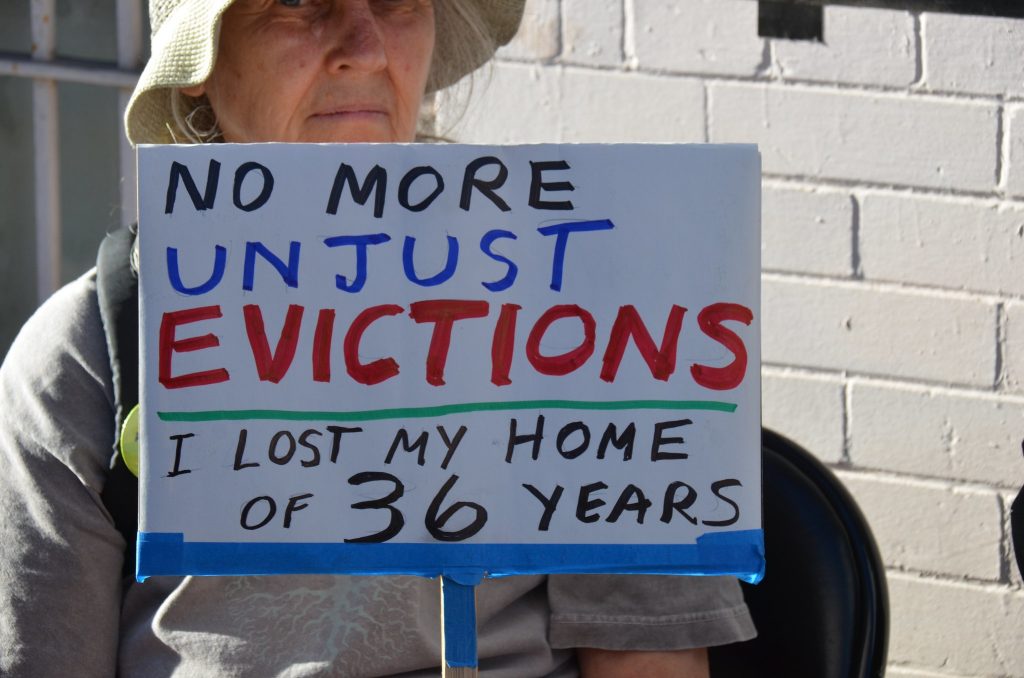On Saturday, the federal eviction and foreclosure moratorium instituted by the Centers for Disease Control and Prevention (CDC) expired. After an eleventh hour scramble to extend the ban, Congress went on recess to go on their summer vacations while millions face eviction and homelessness. This expiration comes as the United States enters the fourth wave of the pandemic, marked by an unbalanced race between lagging vaccination rates and the highly contagious Delta variant.
The moratorium, set to expire last month, was extended by the CDC. On June 30, the Supreme Court ruled, with Brett Kavanaugh as the decisive vote, that congressional action would be needed to extend the moratorium past the July 31 expiration date. According to an analysis by the Consumer Financial Protection Bureau of Census Household Pulse Survey data, around 18.6 million Americans reported experiencing housing distress (defined as falling behind on mortgage or rent payments), and about 16% of renters in the United States risk eviction. The foreclosure moratorium was also set to expire Saturday, but on Friday the U.S. Departments of Agriculture, Housing and Urban Development, Veterans Affairs and the Federal Housing Finance Agency each independently extended their foreclosure-related eviction moratoriums until September 30.
There are over 11 million tenants in the United States who are behind on rent and could face eviction on Saturday. In New York City alone, there are 500,000 tenants owing back rent who will be at risk when evictions resume in September. Across the city, there are over 65,000 eviction filings already on the books. When these moratoriums expire, law enforcement, whose ultimate purpose is to protect capital and private property, will be more than ready to kick the working class out of their homes. The impending homeless crisis is unconscionable in a country that has 59 empty homes for each unhoused person in the US.
After the Supreme Court ruling, the Biden administration made no great effort to initiate an effort in Congress to extend the moratorium. At the last minute, the administration released a statement on Thursday urging lawmakers to act. In the remaining hours before the ban expired, members of the House of Representatives scrambled to come to an agreement on how to extend it. Biden had the power to extend the moratorium through an executive order, potentially giving Congress more time to generate a new one before it would eventually be struck down. Instead, he waited a month to declare it would become Congress’s problem.
Democrats and Republicans are both responsible for this expiration. While Speaker of the House Nancy Pelosi blames Republicans and Representative Alexandria Ocasio-Cortez faults the Biden administration for its last minute announcement, these are ultimately all attempts to divert the blame away from the role of the Democratic Party, which has extensive ties to landlords and real estate interests (at least fifteen of whom are landlords themselves). Though Democrats have a majority in the House, they decided to call for unanimous consent for legislation to extend the moratorium, all but ensuring its failure. The progressive wing of the Democratic party engaged in performative actions opposing the moratorium (Ocasio-Cortez, along with Representatives Cori Bush, Ayanna Pressley, and Ilhan Omar spent the night outside the Capitol to protest) and waited until the eleventh hour to pursue an improbable legislative course of action; without tying this opposition to any of the struggles being waged by housing activists or calling for national action to stand up against evictions, these actions lose their power and merely provide a Left cover for the Democratic Party’s role in ensuring the expiration of the eviction moratorium.
Even if the House was able to send a bill to the Senate, the likelihood of an extension through congressional means would have been very low. Though the majority of Americans supported rent suspension throughout the duration of the pandemic last year, lawmakers do not represent the majority of Americans; they represent the real estate interests that fund their campaigns and lobby for their interests. The housing crisis is not a complicated problem with no possible solutions; there are more than enough housing units in the country to host the unhoused population. Yet under an undemocratic system of governance whose ultimate aim is to serve the interests of capital, Congress is resolving an urgent housing crisis threatening the livelihoods of the working class in favor of the ruling class. Meanwhile, as a new variant of Covid-19 is on the rise, infection rates are still surging, and millions are facing homelessness, the House has adjourned for the summer.
The moratorium will not have the same impact everywhere in the United States. According to The Center on Budget and Policy Priorities, nearly 1 in 4 renters are behind on their housing payments in Florida and South Carolina, compared with 6% in Maine and Kentucky. The areas most at risk of the new Delta variant are the areas with large populations of unvaccinated people, which are disproportionately represented in the Southern and Appalachian states. None of the states in this region have state moratorium extensions, which creates an even more severe health risk for the people at risk of eviction.
The expiration comes as states have struggled to distribute the more than $46 billion of rental assistance set aside by the American Rescue Plan. Only a small fraction of that amount has been actually delivered to those who need it. Distribution has been hampered by the decentralization of the state programs assigned to allocate the funds. Landlords, many of whom are themselves receiving assistance, are moving to evict even those tenants with checks on the way. The assistance, which many renters opted not to apply for out of confusion about eligibility and the application process, will likely not come in time to delay expulsion from their homes.
The pandemic has had an outsized impact on communities of color, who are more likely to be at risk of eviction this Saturday. There are also far fewer homeowners among these communities. Across the country, Black renters are nearly four times as likely to be behind on their rent than white renters. Black women are the most likely to be evicted because of a greater likelihood of precarious employment and the wage gap. The U.S. Census Bureau Household Pulse Survey noted that 29% of Black tenants and 20% of Hispanic respondents said they had deferred or not paid their rent, while among white tenants, the figure was only 11%. These inequitable conditions existed long before the pandemic, but were exacerbated as COVID-19 took its toll in the U.S. This is why tenants-rights and BLM activists have put canceling rent as a central demand throughout the mobilizations of the past year.
The eviction moratorium is a band-aid on a much bigger housing crisis in the United States that has existed long before the pandemic began. While the working class is bearing the brunt of the dragging pandemic, the CEOs of companies that run on exploiting gig workers are becoming even richer and Jeff Bezos is taking trips to outer space. As the Biden administration attempts to capitalize on Americans “going back to brunch”, we can’t forget that we face a homelessness crisis in a country with no shortage of housing. The working class must unfalteringly demand the cancellation of rent and an end to evictions, and harness our collective power to resist evictions in our communities.











